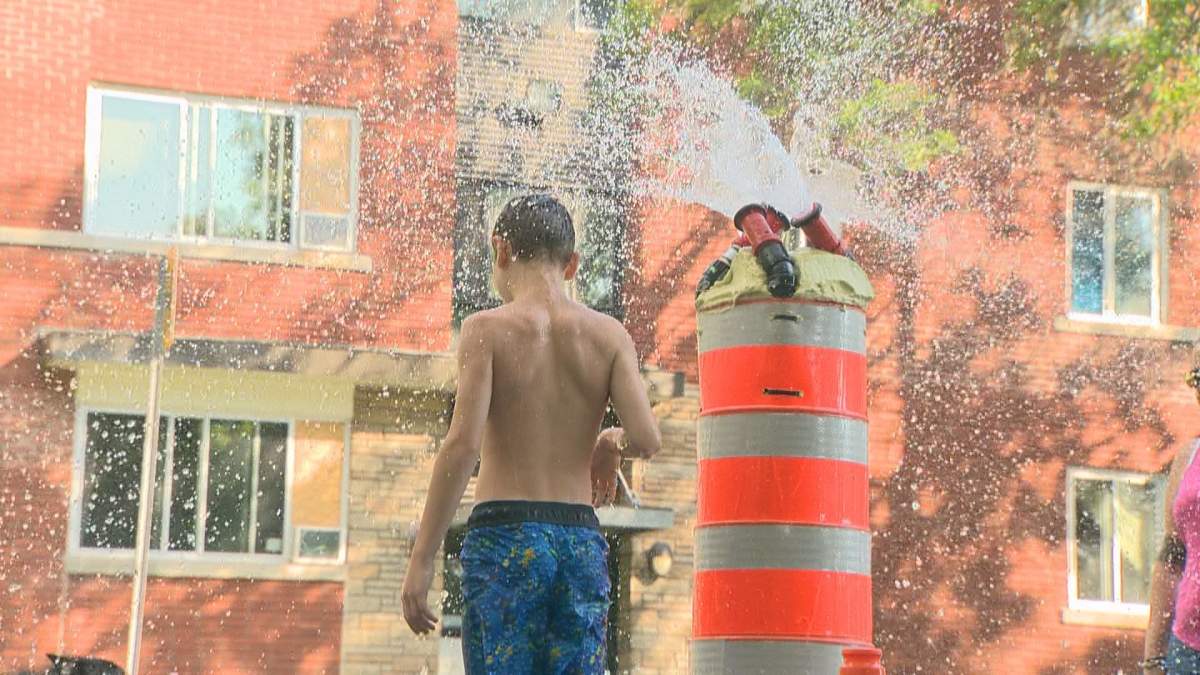Thirty-three deaths have been linked to the heat wave that has gripped Quebec over the last few days, health officials confirmed Thursday.

In Montreal, there have been at least 18 heat-related deaths since the weekend, mostly men aged between 53 and 85.
None of them had air conditioning in their homes.
WATCH: The heat wave gripping Quebec over the past few days has resulted in at least 33 deaths. As Global’s Brayden Jagger Haines reports, Montreal public health points out there was no air conditioning in the victims’ homes.

READ MORE: Montreal heat wave prompts more calls to Urgences-Santé
Public health director Horacio Arruda pointed out most of those who died were part of vulnerable communities, such as people who lived alone or lived with chronic or mental illness.
“If you’re alone at home, don’t stay alone,” insisted Social Services Minister Lucie Charlebois.
She added that people living in long-term care facilities can bring in portable fans or dehumidifiers to their rooms.
“We’re doing the best we can. We would like to have no deaths at all, but every day people die,” Charlebois said.
“Because of the temperature, more people are dying, I cannot deny that, but we are working to have less people than I can expect.”
READ MORE: Heat-related deaths seem concentrated in Quebec, but there’s more to the story
Dr. Mylène Drouin, public health director general of the Montreal region, confirmed crews will continue to be on the ground to knock on doors and check on people, adding that more than 3,400 homes have been visited so far.
“What we are trying to do with our action plan is to reduce those deaths and prevent most of them but it’s impossible to prevent all of them,” she said.
In Montreal, police officers and firefighters knocked on at least 25,000 doors by Thursday evening to check up on residents as the heat wave continues.

Get weekly health news
Authorities in the Eastern Townships, east of Montreal, have attributed at least another five deaths to the weather.
Health officials for the Mauricie and Quebec regions have also confirmed at least one death.
WATCH ABOVE: Do you know the signs of dehydration?
Urgences-Santé has seen an increased number of calls since the heat wave struck.
“Since Sunday, we’ve received almost every day 1,200 calls,” said Benoit Garneau, operations chief.
Tuesday, Montreal Mayor Valérie Plante called on Montrealers to take care of each other.
“Our main priority is to ensure the safety of all Montrealers,” she said.
“If you feel there’s an old neighbour on the side and you’re wondering if they’re safe, please go knock on the door and find out if the person is OK and needs any help.”
No deaths have been reported in other provinces.
In Ontario, a spokeswoman for the coroner’s office said it couldn’t confirm if there were any heat-related deaths, adding it could take weeks or several months to complete such probes.
Kaiser said one reason Quebec has been reporting so many deaths is that it’s part of the province’s extreme heat plan, where health officials work in tandem with first responders and emergency rooms to track down potential cases of heat-related illnesses and deaths.
Montrealers turn to pools and makeshift ways to cool down
Over the past week, Quebecers have been turning to public pools and splash pads to beat the blistering heat.
In Montreal, residents lined up around the block outside of neighbourhood pools earlier this week in order to take a dip.
While public pools had extended hours, the borough of Villeray-Saint-Michel-Parc-Extension was also forced to turn residents away from one of its pools on Monday afternoon because it was at maximum capacity.
In an effort to keep residents cool, the borough of Pierrefonds-Roxboro resorted to a more creative idea by creating a makeshift splash pad from an orange construction cone and placed it on Basswood Street the À-Ma-Baie section of the borough.
“We found some use for the orange cones,” said borough mayor Jim Beis.
“This is a highly dense area and there are no public pools around. Many of the homes don’t have air conditioning so we found a safe place to create this.”
The borough is also asking people to conserve water by only using it for drinking and cooling purposes and not for things like washing cars or watering flowers or plants.
READ MORE: Looking for a place to keep cool during the heat wave?
Signs of heat stroke and what to do
Early signs of heat stroke include fatigue, difficulty concentrating and dizziness.
“You have to drink before you feel thirsty,” said Garneau.
READ MORE: By 2100, 75% of the world’s population will face deadly heatwaves
Here are a few ways to avoid getting ill:
- Drink plenty of water, even before you feel thirsty
- Limit alcohol intake
- Stay in the shade when possible
- Cut back on activities that require effort
- Wear a hat and sunscreen
- Wear lightweight clothing, preferably cotton, to allow sweat evaporation
- Elderly people should avoid going out, especially if they are on medication
If you think you are suffering from heat-related illness:
- Seek shelter or a cool place, rest and drink water
- If possible, use a fan to create air movement
- Use blinds or shades to filter direct sunlight
— With files from Global’s Elysia Bryan-Baynes and The Canadian Press.




Comments
Want to discuss? Please read our Commenting Policy first.